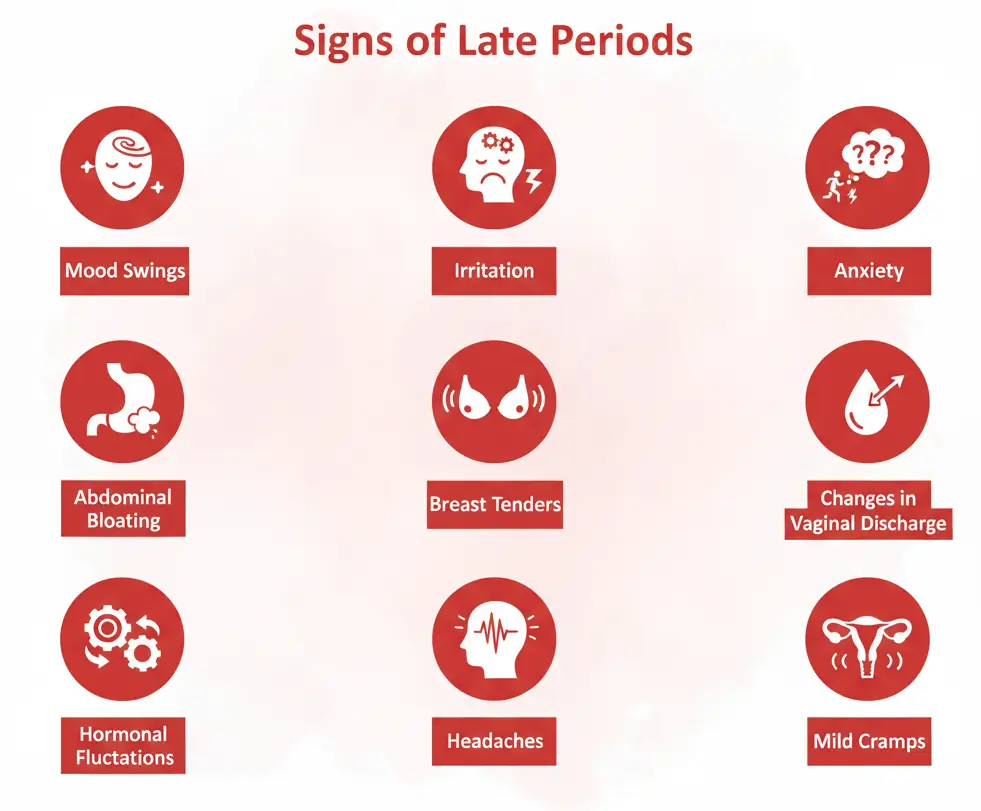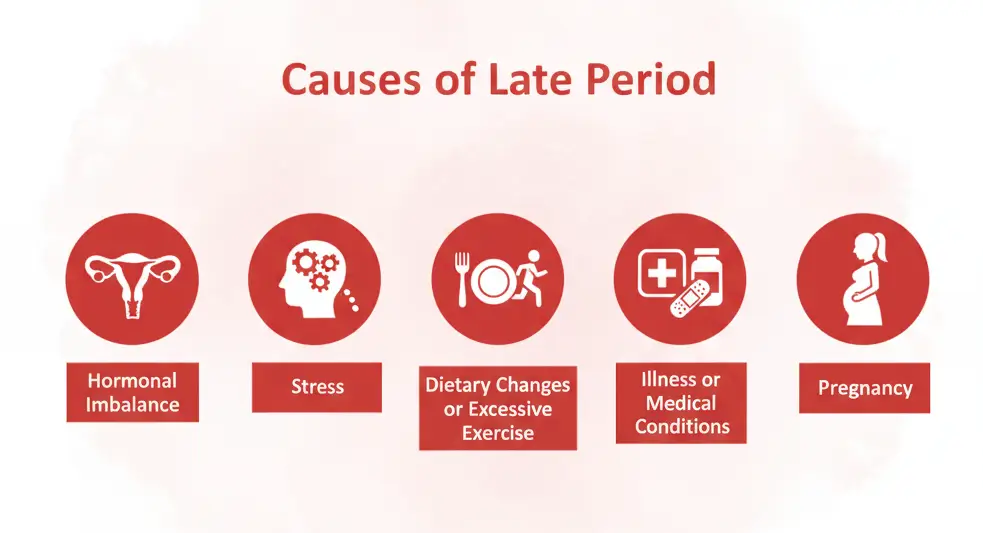Waiting for your period to arrive can be frustrating and often tests your patience. While it is normal for your periods to extend by a few days, it can be scary if they are delayed by more than two weeks. Such situations often cause unnecessary stress and anxiety in women, leaving them eager to understand the reasoning behind a late period.
Having complete knowledge and awareness of all the symptoms and causes that can delay your period is important. This will help you stay calm and deal with such scenarios mindfully.
To bring more clarity, Aastha Fertility Care specialist, Dr. Namita Kotia (MBBS, MS – Obstetrics & Gynaecology), is helping women understand their bodies and the concepts of the menstrual cycle and fertility. Through this blog, she’ll guide you with all the necessary information and precautions that you may require for a stress-free period.
In this guide, we’ll discuss common signs of period coming late, its symptoms, causes, and more.
What is a Late Period?
Periods or Menstruation are a monthly process, where the female body discharges eggs along with blood. This menstrual cycle usually lasts between 21 and 35 days.
However, when the cycle stretches more than the usual time/date, the periods are considered late or irregular. This raises questions in women’s minds, like how much delay in periods is normal? Does stress delay periods, and what are late periods solution? Etc.
However, a shift of a few days in periods is completely normal, but it can be concerning if they are delayed by more than two weeks. This can happen due to various medical and health reasons, which you will get to know further in the blog.
Common Signs That Your Period May Be Late

Our body always gives signals before something goes wrong. And the same is true for conditions like late or irregular periods. We often ignore common signs like mood swings, bloating, breast tenderness, headache, or backaches, and then wonder why our periods are coming late. But these seemingly small symptoms indicate significant changes in your body.
Here’s a brief understanding of the common signs of period coming late, so that you can be aware of all the possibilities. If you are experiencing
- Mood swings
- Irritation
- Anxiety
- Sudden waves of sadness.
- Bloating
- Heaviness in the abdomen
- Swelling of the breasts
- Mild cramps
- Fatigue
- Backaches
- Headaches.
These can be a signs of period coming late
Life Changing Experiences with Aastha Fertility - From Doubt to Success
Early Symptoms Associated with Late Period
Apart from the above-mentioned common signs of period coming late, there can be some other potential reasons for your periods coming late, as proven by several healthcare experts.
Such as,
- Emotional eating and intense food cravings for sweets or salt may seem normal, but this can be an early symptom of late periods.
- Hormonal fluctuations can also lead to sleep disturbances. Hence, resulting in late period arrival.
- Mild spotting without a full flow can also be considered as an early signs of period coming late.
Difference Between Late Period and Missed Period
Many people assume that a late period and a missed period are the same thing, but in reality, they are medically very different. The term “late period” means a delay in the arrival of periods. Whereas, the term “missed period” means the period doesn’t arrive the whole month, i.e, no bleeding for more than 35 – 40 days (varies according to your cycle length).
Periods can be missed due to various reasons such as pregnancy, thyroid issues, PCOS, or any other medical condition.
Causes of Late Period

A recent report by the National Library of Medicine shows that 35.7% of Indian Women suffer irregular or late periods.
While only a small number of women understand the reason behind a late period.
Let’s understand the various reasons that can cause late periods, so that you can be cautious in the future.
- Hormonal Imbalance:
Hormonal function is the most crucial factor when it comes to understanding the menstrual cycle. The menstrual cycle is controlled by a balance of hormones like estrogen, progesterone, luteinizing hormone (LH), and follicle-stimulating hormone (FSH). When these hormones work in harmony, your periods arrive on time. But if these hormones are imbalanced, then it can lead to a late period.
If you are experiencing this issue, you can consult a gynecologist for advice and hormonal balance.
- Stress:
The most ignored reason for late periods is tension. Taking any kind of emotional or physical stress/tension directly affects our hormones. This causes an imbalance in the menstrual cycle.
To avoid unnecessary stress, you can practice meditation, yoga, and other relaxation techniques.
- Dietary Changes or Excessive Exercise:
Sudden changes in the diet or doing excessive exercise can impact our mental and physical health, such as gaining or losing weight. This can also disturb your menstrual cycle.
Eat foods rich in iron and healthy fats, and focus on a balanced diet. Also, focus on sustainable lifestyle changes and avoid extra exercises to have proper rest and energy. These habits work great as late period solution.
- Illness or Medical Conditions:
Every female body is different and reacts differently in certain medical or health conditions. Illness or medical conditions like PCOS, thyroid, etc., cause major changes in the menstrual cycle of females.
Reach out to a doctor, get regular checkups, and follow the advised treatment or medications.
- Pregnancy:
One of the most common reasons for late periods is pregnancy. If you are sexually active, then it might be one of the reasons behind your late periods. To ensure such conditions, take a pregnancy test or consult a doctor.
When to Take a Pregnancy Test
Late periods are the most common and obvious sign of pregnancy.
If you are sexually active and your period is late by a week of your expected date, then it is suggested to take a pregnancy test. Women can easily take a pregnancy test at home through a urine-based test kit.
Here are some tips to look out for accurate results:
- Take the test in the morning, as our HGC hormones are at their highest in the morning.
- If the test comes back negative and your period still doesn’t arrive, repeat the test after 5-7 days or reach out to fertility specialists.
When to Consult a Doctor for Late Period
If you have missed your period for more than two months or experience severe body pains, cramps, or abnormal bleeding during periods, then you should consult a specialist.
Apart from this, if you are planning a pregnancy but facing problems like irregular periods or PCOS, you should instantly reach out to a gynecologist or fertility specialist for an expert solution and get the required treatment.
Many sexually active women often assume that pregnancy is the only cause of their late periods. But in reality, even if you are sexually inactive, there are many other severe and underrated reasons, like stress, travel, hormone fluctuations, or medical conditions like PCOS and thyroid. These factors not only affect your menstrual cycle but also your physical and mental health.
Therefore, we at Aastha Fertility Care guide our patients with accurate information and utmost care. Helping and encouraging women to lead a stress-free and happy life.
If you are experiencing issues like late, irregular, or missed periods, don’t wait for such problems to get fixed automatically. Book a consultation with us and regulate your menstrual cycle the right way.
FAQs: Signs of periods coming late
1. What does it mean when your period is late?
It means your menstrual cycle has extended due to stress, hormones, or pregnancy.
2. What are common signs of period coming late?
Some common signs of period coming late are severe mood swings, cramps, bloating, and back or stomachaches.
3. Can mild cramps occur even if the period is late?
Yes, mild cramps can occur even if the period is late. Hormonal changes trigger cramps before bleeding starts.
4. What changes in breast tenderness or mood happen with a late period?
When a period is late, it causes tender breasts and mood swings due to progesterone acting for a longer period of time.
5. How does vaginal discharge change before a late period?
Changes in the form of discharge, such as becoming thick or sticky, are common when menstruation starts or is delayed.
6. Can diet or stress cause a late period?
Yes, taking unnecessary stress or eating unhealthy food can affect your menstrual cycle, resulting in late periods.
7. When should you consider taking a pregnancy test?
If you are sexually active and your period gets delayed by a week, you should consider taking a pregnancy test.
8. What medical conditions can cause late periods?
PCOS, thyroid, or any other medical condition can cause late periods.
9. When is it important to see a doctor about a late period?
If you are having frequent irregular periods or severe pains, then you should instantly consult a doctor.
10. Can lifestyle changes help regulate late or missed periods?
Yes, Balanced lifestyle habits like a healthy diet, proper sleep, and stress management can help you regulate late periods.







Leave a comment